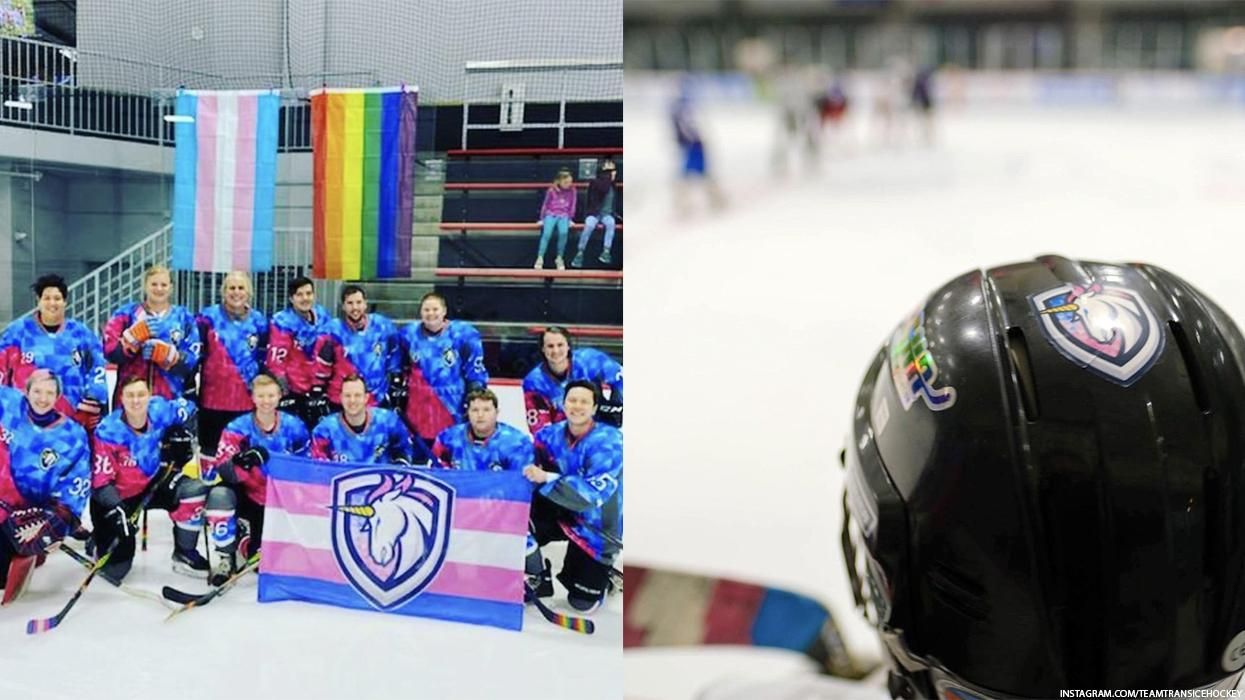Transgender athletes are under attack now more than ever, with little support from mainstream sports institutions. While it has not always been known as a progressive organization, the National Hockey League recently shifted the landscape for transgender athletes with their vocal support of Team Trans.
Team Trans is an international collective of hockey players who all identify as trans or gender non-conforming. In November, they held a tournament in Madison, Wisconsin, featuring six teams made up entirely of transgender players.
While the tournament was a “powerful” event for the players, it also marked a significant step forward for the NHL. They not only provided funding for travel and equipment expenses, but also openly uplifted transgender athletes by promoting and defending them on social media.
\u201cIt\u2019s hard to tell from this photo, but this is nearly eighty trans folks holding each other in our grief and in our joy.\u201d— Team Trans Ice Hockey (@Team Trans Ice Hockey) 1669019317
Sawyer James, a skater and goalie for Team Trans, recently told The Advocate Channel that while there have always been queer hockey fans, their growing prevalence has pushed the NHL to include to them.
“When you market for a business, you market to your audience. The LGBTQ+ audience hasn't always been as big as it has been recently, so [the NHL] wasn’t really marketing towards everybody,” James explains, adding, “But because the LGBTQ+ community has stepped up and ramped up all of our fight … the NHL has realized that we do need to do something about this. We do need to include them, because there are players in the LGBTQ+ community in our league, whether they're out or not. We need to support them.”
To Kiera Wiele of Team Trans, the NHL has been “a little bit more forward” in their support of the LGBTQ+ communities compared to other sports organizations, such as the National Football League or Major League Baseball.
“The existence of things like Team Trans — I'm not aware of a similar organization in football or baseball or what have you,” she says. “There are queer organizations, absolutely. But the other sporting organizations have seen seemed more reluctant to be quite as vocal about their support.”
In 2021, Luke Prokop became the first openly gay player under contract to an NHL team. There have yet to be any openly transgender players in the league, though James says that “the NHL would not hesitate to draft a trans player,” it’s simply a matter of skill.
“I would not want to see [a team] draft a trans player just to draft a trans player, and have that person sit on the bench, and be on the team but not really on the team, so to speak. That would cheapen it to me,” Wiele adds.
While there are many talented transgender hockey players, James says that many choose to “focus on who they are” instead of continuing in sports, meaning they prioritize their physical transition rather than staying in leagues aligned with their birth sex. Since they often cannot join leagues that align with their gender identity, many give up athletics altogether.
“If I focused on hockey more, I would have probably made it a lot further. But my transition was also more important to me,” James says. “I have a feeling that a lot of trans people and nonbinary people focus on who they are and coming out, [rather] than a sport.”
Last year saw a record-breaking amount of anti-LGBTQ+ legislation proposed in the United States, a majority of which was aimed at transgender individuals. Many bills targeted gender-affirming care, as well as transgender participation in athletics. James believes this trend could be a big factor “in regard to why we haven't seen somebody that's trans or nonbinary go as far as the NHL.”
While the NHL cannot directly influence legislation, they can work to change hearts and minds. Mason LeFebvre, vice president of communications and goalie for Team Trans, says that their support was especially welcome for their November tournament, as the NHL was unashamed to promote them, and even sent a media team to cover the event. LeFebvre mentions that the NHL provided funding for the tournament the previous year, but they were not as open about it, as they did not post about it on their main pages.
\u201cThe NHL is proud to support this past weekend's Team Trans Draft Tournament in Middleton, Wisconsin. This was the first tournament comprised entirely of transgender and nonbinary players, with around 80 folks participating! #HockeyIsForEveryone #NHLPride\u201d— NHL (@NHL) 1669129506
Because of their openness this past tournament, the League unfortunately received backlash from fans online. The Team Trans members express frustration at the amount of vitriol that was aimed at the tournament, especially considering they were playing other transgender people.
“No matter what league we compete in, there's backlash,” James says. “Oh, I shouldn't be in that league because I'm not a woman, or I shouldn't be in this because I'm apparently not a man, right? And then when they tell us to go play against each other and we do, they still have backlash. It's still not good enough for them. It's like they're trying to destroy us, and make us nonexistent.”
LeFebvre says that a large percentage of comments feign concern for safety, citing the same transphobic argument used by legislators to keep transgender athletes from competing against cisgender athletes — it’s either too “dangerous” or “unfair” for people whose sex is male to play against those whose sex is female due to the physical disparities.
James explains that the primary difference between traditional men and women’s hockey leagues is that men’s hockey allows physical hits and body checks, whereas those practices are banned in women’s leagues because officials “were afraid of damaging the internal organs that women have.” Regardless, many recreational hockey leagues do not permit hitting for any gender.
“It's adult rec hockey,” Lefebvre says. “No matter where I play, I'm going to be playing against cis people and trans people who are taller and shorter than me. The skill is all over the place, the sizes are all over the place, the speed is all over the place. [Sex] is no different.”
Lefebvre adds that the argument is misguided even when applied to cases of transgender athletes competing with cisgender athletes. He says there will always be physical disparities between athletes, regardless of what category they’re in.
“If size difference and strength difference is your concern, then why do boys who have hit puberty still play with boys their age who haven't hit puberty?” Lefebvre asks. “If you've got two twelve-year-olds and one of them hit puberty and the other hasn't, he's probably got several inches and quite a bit of weight on him compared to the kid that hasn't. But they play together. It's not about safety. They just don't like us for existing.”
He adds: “You make [trans people] go play on their own. And now you're complaining that we're doing that? You just don't want us included.”
To Wiele, the entire debate around transgender athletes has been “so blown out of proportion.” There are few competing transgender athletes in the world, but even if there were more, she says it wouldn’t matter.
“You're talking about such a tiny handful of athletes,” Wiele says, adding, “[Nobody] is absolutely dominating the sport because [they’re] trans. That's not a thing. And the science has shown repeatedly that that's not a thing. Even if it was, and there was somebody who was absolutely dominating their sport, that one person dominating that sport is a totally fine price to pay, in my opinion, for the lives of trans youth.”
\u201c@BlueMountian12 Trans women are women. Trans men are men. Nonbinary identity is real.\u201d— NHL (@NHL) 1669129506
The Team Trans players say they feel supported by the NHL, but that consistent advocacy and efforts from the organization could change the game for transgender athletes. They also believe that there are steps the NHL could take beyond funding and social media support to enfranchise transgender players, and even cisgender women interested in the sport.
“One area in which I think the NFL has done really well is female [referees], for example, starting to pop up in NFL games and things like that, getting more representation not just at the grassroots level,” Wiele says.
Though they may be met with backlash, James says that the NHL shouldn’t shy away from supporting LGBTQ+ causes. He says transgender inclusion isn’t political — it’s just equality.
“People think, ‘oh, keep politics out of hockey.’ Then you’ve got to keep your own opinions out of hockey, too,” James says. “If you're saying a trans man or trans woman can't play hockey or can't play in the NHL, that's bringing politics into it.”
He adds: “If you don't think that anybody can play hockey, don't watch it.”
Breaking down the NHL pride ban

- NHL Pride Jerseys Abandoned by Teams After Conservative Pushback | AdvocateChannel.com ›
- Next in Fashion's James Ford on Reclaiming His Identity Through Clothing | AdvocateChannel.com ›
- Megan Rapinoe and Sue Bird Sign Letter Condemning Anti-Trans Sports Bills | AdvocateChannel.com ›
- Dallas Stars Coach Speaks Out After Mall Shooting | AdvocateChannel.com ›
- ESPN Anchor Under Fire For Mocking Indigenous NHL Player's Name | AdvocateChannel.com ›
- Why Is Minnesota So Blue? | AdvocateChannel.com ›
- Donald Trump Gives the Game Away on Conservatives' Transgender Panic ›
- Lance Armstrong, Admitted Cheater, Questions 'Fairness of Trans Athletes in Sports' ›
- NHL Player Alex Galchenyuk Fired After Using Racial Slurs During Traffic Stop ›
- New Women's Professional Hockey League, PWHL, to Launch in January ›
- Nebraska Volleyball Breaks Record For Most-Watched Women’s Sporting Event ›
- Aaron Rodgers Could Be Out For the Rest of the Season ›
- Republican Presidential Candidates Target Transgender People ›
- The Truth About Transgender Suicide Rates ›
- Montana House Speaker Silences Transgender Lawmaker Before Passing Anti-Trans Bill ›
- This Southern Mexico Community Has Defied the Gender Binary For Generations ›
- How Joyland Survived Censorship and Anti-Trans Protests ›
- World Athletics Bans Transgender Women From Competing in Women's Categories ›
- NHL Bans Pride Tape, Stops Players From Showing LGBTQ+ Support At Games ›
- NHL Reverses Pride Tape Ban After Fans & Players Speak Out ›
- NHL Suspends Ottawa Senators' Shane Pinto For 41 Games For Violating Gambling Rules ›
- Shane Pinto Suspension Displays NHL Gambling Double-Standard ›
- The NHL Demonstrates Why LGBTQ+ Players Stay in the Closet ›
- NHL Nixes All Theme Jerseys After Pride Debacle ›
- Chicago Blackhawks Will Not Wear Pride Jerseys, Citing Safety of Russian Players ›



















































